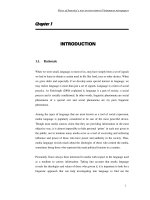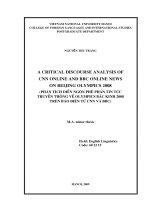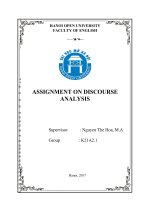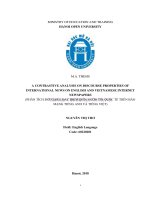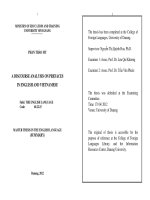Assignment on discourse analysis
Bạn đang xem bản rút gọn của tài liệu. Xem và tải ngay bản đầy đủ của tài liệu tại đây (742.2 KB, 21 trang )
<span class="text_page_counter">Trang 1</span><div class="page_container" data-page="1">
<b>HANOI OPEN UNIVERSITY</b>
</div><span class="text_page_counter">Trang 2</span><div class="page_container" data-page="2"><b>TABLE OF CONTENTS</b>
<b>1. Prove that text is a written one...</b>
<b>5</b><b>1.1. In terms of grammatical complexity...</b>
<b>5</b><b>1.2.In terms of lexical density...</b>
<b>7</b><b>2. Grammatical and lexical cohesive devices employed in the text . 8 </b>
<b>2.1. Grammatical cohesive devices...</b>
<b>8</b><b>2.2. Lexical cohesive devices...</b>
<b>13</b><b>III.TRANSLATE INTO VIETNAMESE...</b>
<b>14</b><b>IV. CONCLUSION...</b>
<b>18</b><b>V. REFERENCES...</b>
<b>19</b></div><span class="text_page_counter">Trang 3</span><div class="page_container" data-page="3">Discourse analysis is a research method for studying written or spoken language in relation to its social context. It aims to understand how language is used in real life situations.
Discourse analysis is a common qualitative research method in many humanities and social science disciplines, including linguistics, sociology, anthropology, psychology and cultural studies.
Conducting discourse analysis means examining how language functions and how meaning is created in different social contexts. It can be applied to any instance of written or oral language, as well as non-verbal aspects of communication such as tone and gestures.
By analyzing these types of discourse, researchers aim to gain an understanding of social groups and how they communicate.
In this assignment, I applied the knowledge I have studied about discourse analysis to analyse a literary text (prove the text is written language, find grammatical and lexical cohesive devices employed in the text, and translate the text into Vietnamese).
<b>II. ANALYSIS</b>
<b>TUESDAYS WITH MORRIE</b>
(1)His death sentence came in the summer of 1994. Looking back, Morrie knew something bad was coming long before that. He knew it the day he gave up dancing.
(4)He had always been a dancer, my old professor. The music didn’t matter. Rock and roll, big band, the blues. He loved them all. He would close his eyes and with a blissful smile begin to move to his own sense of rhythm. It wasn’t always pretty. But then, he didn’t worry about a partner. Morrie danced by himself.
</div><span class="text_page_counter">Trang 4</span><div class="page_container" data-page="4">and Morrie would wander in among the mostly student crowd, wearing a white T-shirt and black sweatpants and a towel around his neck, and whatever music was playing, that’s the music to which he danced. He’d do the lindy to Jimi Hendrix. He twisted and twirled, he waved his arms like a conductor on amphetamines, until sweat was dripping down the middle of his back. They just thought he was some old nut. No one there knew he was a prominent doctor of sociology, with years of experience as a college professor and several well-respected books. They just thought he was some old nut.
(18)Once, he brought a tango tape and got them to play it over the speakers. Then he commandeered the floor, shooting back and forth like some hot Latin lover. When he finished, everyone applauded. He could have stayed in that moment forever.
(22)But then the dancing stopped.
(23)He developed asthma in his sixties. His breathing became labored. One day he was walking along the Charles River, and a cold burst of wind left him choking for air He was rushed to the hospital and injected with Adrenalin.<b>.</b>
(26) A few years later, he began to have trouble walking. At a birthday party for a friend, he stumbled inexplicably. Another night, he fell down the steps of a theater, startling a small crowd of people.
“Give him air!” someone yelled.
(30)He was in his seventies by this point, so they whispered “old age” and helped him to his feet. But Morrie, who was always more in touch with his insides than the rest of us, knew something else was wrong. This was more than old age. He was weary all the time. He had trouble sleeping. He dreamt he was dying. (34)He began to see doctors. Lots of them. They tested his blood. They tested his urine. They put a scope up his rear end and looked inside his intestines. Finally, when nothing could be found, one doctor ordered a muscle biopsy, taking a small piece out of Morrie’s calf. The lab report came back suggesting a neurological problem, and Morrie was brought in for yet another series of tests. In one of those tests, he sat in a special seat as they zapped him with electrical current—an electric chair, of sortsand studied his neurological responses.
</div><span class="text_page_counter">Trang 5</span><div class="page_container" data-page="5">(41)“We need to check this further,” the doctors said, looking over his results. “Why?” Morrie asked. “What is it?”
“We’re not sure. Your times are slow.” His times were slow? What did that mean? (44)Finally, on a hot, humid day in August 1994, Morrie and his wife, Charlotte, went to the neurologist’s office, and he asked them to sit before he broke the news: Morrie had amyotrophic lateral sclerosis (ALS), Lou Gehrig’s disease, a brutal, unforgiving illness of the neurological system.
There was no known cure.
“How did I get it?” Morrie asked. Nobody knew. “Is it terminal?”
“So I’m going to die?”
Yes, you are, the doctor said. I’m very sorry.
(54)He sat with Morrie and Charlotte for nearly two hours, patiently answering their questions. When they left, the doctor gave them some information on ALS, little pamphlets, as if they were opening a bank account. Outside, the sun was shining and people were going about their business. A woman ran to put money in the parking meter. Another carried groceries. Charlotte had a million thoughts running through her mind: How much time do we have left? How will we manage? How will we pay the bills?
(60)My old professor, meanwhile, was stunned by the normalcy of the day around him. Shouldn’t the world stop? Don’t they know what has happened to me? (62)But the world did not stop, it took no notice at all, and as Morrie pulled weakly on the car door, he felt as if he were dropping into a hole.
Now what? he thought.
</div><span class="text_page_counter">Trang 6</span><div class="page_container" data-page="6">(65)As my old professor searched for answers, the disease took him over, day by day, week by week. He backed the car out of the garage one morning and could barely push the brakes. That was the end of his driving.
(68)He kept tripping, so he purchased a cane. That was the end of his walking free. He went for his regular swim at the YMCA, but found he could no longer undress himself. So he hired his first home care worker—a theology student named Tony— who helped him in and out of the pool, and in and out of his bathing suit. In the locker room, the other swimmers pretended not to stare. They stared anyhow. That was the end of his privacy.
(74)In the fall of 1994, Morrie came to the hilly Brandeis campus to teach his final college course. He could have skipped this, of course. The university would have understood. Why suffer in front of so many people? Stay at home. Get your affairs in order. But the idea of quitting did not occur to Morrie.
(78)Instead, he hobbled into the classroom, his home for more than thirty years. Because of the cane, he took a while to reach the chair. Finally, he sat down, dropped his glasses off his nose, and looked out at the young faces who stared back in silence.
(82)“My friends, I assume you are all here for the Social Psychology class. I have been teaching this course for twenty years, and this is the first time I can say there is a risk in taking it, because I have a fatal illness. I may not live to finish the semester.
(86) “If you feel this is a problem, I understand if you wish to drop the course.” He smiled.
And that was the end of his secret.
(89)ALS is like a lit candle: it melts your nerves and leaves your body a pile of wax. Often, it begins with the legs and works its way up. You lose control of your thigh muscles, so that you cannot support yourself standing. You lose control of your trunk muscles, so that you cannot sit up straight. By the end, if you are still alive, you are breathing through a tube in a hole in your throat, while your soul, perfectly awake, is imprisoned inside a limp husk, perhaps able to blink, or cluck a
</div><span class="text_page_counter">Trang 7</span><div class="page_container" data-page="7">tongue, like something from a science fiction movie, the man frozen inside his own flesh. This takes no more than five years from the day you contract the disease. Morrie’s doctors guessed he had two years left. Morrie knew it was less.
(98)But my old professor had made a profound decision, one he began to construct the day he came out of the doctor’s office with a sword hanging over his head. Do I wither up and disappear, or do I make the best of my time left? he had asked himself.
He would not wither. He would not be ashamed of dying.
(103)Instead, he would make death his final project, the center point of his days. Since everyone was going to die, he could be of great value, right? He could be research. A human textbook. Study me in my slow and patient demise Watch what. happens to me. Learn with me.
(107)Morrie would walk that final bridge between life and death, and narrate the trip.
(109)The fall semester passed quickly. The pills increased. Therapy became a regular routine. Nurses came to his house to work with Morrie’s withering legs, to keep the muscles active, bending them back and forth as if pumping water from a well. Massage specialists came by once a week to try to soothe the constant, heavy stiffness he felt. He met with meditation teachers, and closed his eyes and narrowed his thoughts until his world shrunk down to a single breath, in and out, in and out.
(Source: “Tuesdays with Morrie” By Mitch Albom)
<b>1. Prove that text is a written one</b>
“Tuesdays with Morrie” is a novel which is found in literacy form. This following analysis will improve that this novel is really a written text throughout grammar and lexical density.
<b>1.1.In terms of grammatical complexity</b>
</div><span class="text_page_counter">Trang 8</span><div class="page_container" data-page="8">Linguistically, written language tends to consist of clauses that are internally complex, whereas with spoken language the complexity exists in the ways in which clauses are joined together.
- He would close his eyes and with a blissful smile begin to move to his own sense of rhythm. (line 5,6)
- They had flashing lights and booming speakers and Morrie would wander in among the mostly student crowd, wearing a white T-shirt ...(line 9, 10, 11, 12) - He twisted and twirled, he waved his arms like a conductor on amphetamines, until sweat was dripping down the middle of his back. (line 13, 14)
- . No one there knew he was a prominent doctor of sociology, with years of experience as a college professor and several well-respected books. (line 15, 16) - When he finished, everyone applauded (line 20)
- He was in his seventies by this point, so they whispered “old age” and helped him to his feet (line 30, 31)
- Finally, when nothing could be found, one doctor ordered a muscle biopsy, taking a small piece out of Morrie’s calf. (line 35, 36)
- The lab report came back suggesting a neurological problem, and Morrie was brought in for yet another series of tests (line 37, 38)
- Finally, on a hot, humid day in August 1994, Morrie and his wife, Charlotte, went to the neurologist’s office, and he asked them to sit before he broke the news...(line 44, 45)
- He sat with Morrie and Charlotte for nearly two hours, patiently answering their questions.(line 54, 55)
- When they left, the doctor gave them some information on ALS, little pamphlets, as if they were opening a bank account. (line 55, 56) - But the world did not stop, it took no notice at all, and as Morrie pulled weakly on the car door, he felt as if he were dropping into a hole. (line 62, 63)
</div><span class="text_page_counter">Trang 9</span><div class="page_container" data-page="9">- As my old professor searched for answers, the disease took him over, day by day, week by week. (line 65, 66)
- So he hired his first home care worker—a theology student named Tony—who helped him in and out of the pool, and in and out of his bathing suit. (line 70, 71) - Finally, he sat down, dropped his glasses off his nose, and looked out at the young faces who stared back in silence. (line 80,81)
- I have been teaching this course for twenty years, and this is the first time I can say there is a risk in taking it, because I have a fatal illness. (line 83, 84) - If you feel this is a problem, I understand if you wish to drop the course. (line 86) - You lose control of your thigh muscles, so that you cannot support
yourself standing. (line 90, 91)
- You lose control of your trunk muscles, so that you cannot sit up straight. (line 91, 92)
- By the end, if you are still alive, you are breathing through a tube in a hole in your throat, while your soul,.... (line 92, 93, 94)
- Morrie would walk that final bridge between life and death, and narrate the trip. (line 97)
- Nurses came to his house to work with Morrie’s withering legs, to keep the muscles active, bending them back and forth as if pumping water from a well. (line 101, 102)
- He met with meditation teachers, and closed his eyes and narrowed his thoughts until his world shrunk down to a single breath, in and out, in and out. (line 102, 103).
<b>1.2.In terms of lexical density.</b>
Most sentences in the text “ Tuesdays with Morrie” display a much higher ratio of content words than total functional words:
</div><span class="text_page_counter">Trang 10</span><div class="page_container" data-page="10">He began to see doctors. Lots of them. They tested his blood. They tested his urine. They put a scope up his rear end and looked inside his intestines. Finally, when nothing could be found, one doctor ordered a muscle biopsy, taking a small piece out of Morrie’s calf. The lab report came back suggesting a neurological problem, and Morrie was brought in for yet another series of tests. In one of those tests, he sat in a special seat as they zapped him with electrical current—an electric chair, of sortsand studied his neurological responses.
a. Content word/ lexical word: see, doctors, tested(2), blood, urine, put, scope, rear-end, looked, intestines, finally, nothing, be found, doctor, ordered, muscle, biopsy, taking, small, piece, Morrie’s calf, lab, report, came, suggesting, neurological(2), problem, was, brought, yet, series, tests (2), sat, special, seat, zapped, electrical, current, electric, chair, studied, responses.
(45 words)
b. Function word: He, them, they(3), his, up, and(2), inside, his, one(2), a(4), out, the, back, in(2), with, an.
(24 words)
<b>2. Grammatical and lexical cohesive devices employed in the text2.1. Grammatical cohesive devices</b>
2.1.1. Reference
<b>2.1.1.1. Personal reference</b>
- His (line 1): personal reference, endophoric, cataphoric His -> Morrie
- He (line 2, 3, 4): personal reference, endophoric, anaphoric
</div><span class="text_page_counter">Trang 11</span><div class="page_container" data-page="11">He -> Morrie
- He (line 4): personal reference, endophoric, cataphoric He -> my old professor
- Them (line 5): personal reference, endophoric, anaphoric Them -> Rock and roll, big band, the blues
- He (line 7): personal reference, endophoric, cataphoric He -> Morrie
- They (line 9, 10): personal reference, endophoric, anaphoric They -> this church
- He (line 14): personal reference, endophoric, anaphoric
- They (line 14, 16): personal reference, endophoric, anaphoric They -> mostly student
- Them (line 18): personal reference, endophoric, anaphoric Them-> mostly student
- They (line 30): personal reference, endophoric, anaphoric They-> people
- His (line 32): personal reference, endophoric, anaphoric
- He (line 34): personal reference, endophoric, anaphoric He-> Morrie
- They (line 34, 35): personal reference, endophoric, anaphoric
</div><span class="text_page_counter">Trang 12</span><div class="page_container" data-page="12">- We (line 41): personal reference, endophoric, cataphoric We -> doctors
- He (line 45): personal reference, endophoric, anaphoric He -> the neurologist
- Them (line 45): personal reference, endophoric, anaphoric Them -> Morrie and his wife
- You (line 53): personal reference, endophoric, anaphoric You-> Morrie
- They (line 55, 56, 57): personal reference, endophoric, anaphoric They-> Morrie and Charlotte
- Her (line 58): personal reference, endophoric, anaphoric
- He (line 63, 64): personal reference, endophoric, anaphoric He-> Morrie
- His first home care worker (line 70): personal reference, endophoric, cataphoric His first home care worker -> Tony
- His (line 71): personal reference, endophoric, anaphoric
- They (line 72): personal reference, endophoric, anaphoric They -> swimmers
- It (line 89): personal reference, endophoric, anaphoric It -> ALS
</div>


